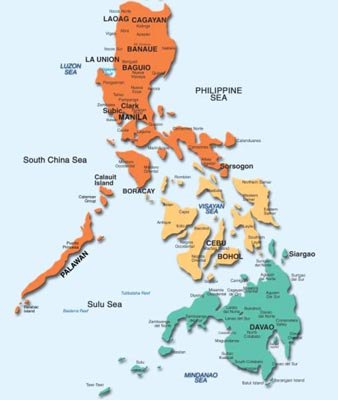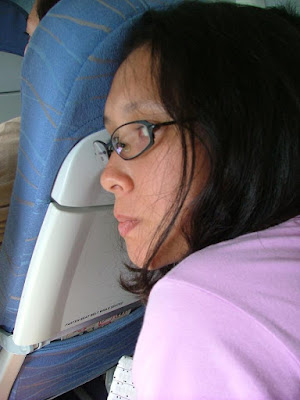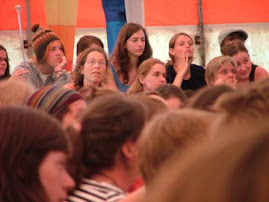For the past days I've been coming home from work at 10 p.m. All for the love of Simunul, Tawi-Tawi. That's where the Sheik Makhdum mosque anniversary celebration's going to be on Nov. 6-7. Sheik Makhdum mosque's the oldest in the country. Built in the 14th century - out of logs. The four original wooden posts still remain but the rest of the mosque is new. Have already been to Sulu and Basilan. It's my first time to Tawi-Tawi. Exciting. This here below is my draft press release, Maya style. More stories and pics are coming. :)


 Around 628 hundred years ago, in the small island of Simunul just across Bongao, the capital of Tawi-Tawi, the first Muslim mosque was built by Arabian missionary Sheik Karin UI Makhdum. According to the sarsila (local histories), Sheik Makhdum taught the Sama of Simunul about Islam and impressed them with his supernatural ability of carrying tree trunks from the jungle to the seashore as if they weighed no more than matchsticks.
Around 628 hundred years ago, in the small island of Simunul just across Bongao, the capital of Tawi-Tawi, the first Muslim mosque was built by Arabian missionary Sheik Karin UI Makhdum. According to the sarsila (local histories), Sheik Makhdum taught the Sama of Simunul about Islam and impressed them with his supernatural ability of carrying tree trunks from the jungle to the seashore as if they weighed no more than matchsticks.Today, only four wooden pillars remain of the old mosque. They are displayed inside the Sheik Makhdum mosque that stands where the old mosque once stood, a testament that the spread of Islam in the Philippines started here. Every year on November 6, the Autonomous Region of Muslim Mindanao (ARMM) celebrates the founding of the mosque.
For this year’s Sheik Makhdum mosque anniversary, the local government of Simunul has launched the Ziarah Simunul (Visit Simunul) campaign as a response to the renewed hostilities between the government of the Philippines and the Moro Islamic Liberation Front (MILF). The Ziarah Simunul campaign advocates for the immediate resolution of the conflict through following the example of the Sheik Makhdum mosque where the community gathers to not only pray but also to consult with each other and plan courses of action to promote peace and development.
The two-day celebration on November 6 and 7 will start with a banug-banug pangalay or fluvial parade of Sama bancas or small boats and also feature a kinakan or food festival, and a cultural night of indigenous songs and dances participated by Simunul’s 16 barangays.
Another highlight of the celebration is the launching of development projects, some of which are the result of a participatory and consultative process undertaken to formulate Simunul’s Comprehensive Development Plan-Executive and Legislative Agenda (CDP-ELA) with the help of the Canadian International Development Agency (CIDA) funded Local Governance Support Program in the Autonomous Region of Muslim Mindanao (LGSPA).
Also included in the festivities is the restaging of the Community Big Book reading to highlight the innovative approach to promoting peace and preventing conflict in Simunul. Early this year, the Community Big Book project was supported by LGSPA’s community peace fund, which brought together elders and traditional storytellers to tell their stories. Teachers then documented the stories while schoolchildren made colorful drawings and artwork, which were all compiled into one book and read by the children during community gatherings.
Organized by the local Teachers’ Association, the story-telling sessions revealed the peaceful coexistence that characterized the community in the past and led residents of two disunited barangays in Simunul to rediscover and retrace their roots to the same group of ancestors who had built the foundation of the present-day communities. Through the Community Big Book, residents of Simunul were able to use their memories of past events to promote present day conflict resolution at the village level and strive for harmony in the community.
The Muslim Religious Leaders (MRLs), ‘power centers’ of Muslim society, also play a key role in advocating for peace and good governance in ARMM based on the teaching of Islam. A good example of how they have made a difference in popularizing Islamic values and virtues as core ingredients of good governance will be shown during the Sheik Makhdum mosque anniversary celebration’s community presentation of the Selected Khutba: A Guide to Social Development for the Muslim Communities in the Philippines.
With the help of LGSPA, 2,000 copies were published of the one-year set of Khutba guidelines to be used for the Friday mosque worship homily with the masjid preachers. The creation of these Khutba guidelines on good governance, social justice, peaceful conflict resolution in Islam, and the like, was spearheaded by the five principal muftis of ARMM and finalized after a series of workshops and meetings spanning more than a year. What makes the Selected Khutba such an inspiring endeavor is the fact that it is an expression of more strengthened and concerted efforts of ARMM’s five principal muftis who come from different ethno linguistic backgrounds, to undertake advocacy on the teachings of Islam that significantly promotes peace and good governance.
A highlight of the community presentation of the Selected Khutba is the symbolic turnover of several copies of the English version as well as copies of the 20 khutab of the Selected Khutba’s Sama version to be turned over by Mufti Abdulwahid Inju of Tawi-Tawi to Simunul’s local government officials and MRLS. What makes the community presentation of the Selected Khutba doubly significant is the participation not only of the LGU and the MRLs but also of Parhimpunan Raayat Ma Kasambuhan Tawi-Tawi, Inc. or PARMATA, Tawi-Tawi’s most active civil society organization (CSO).
Composed of 21 member organizations from cooperatives, non-government associations, people’s organizations, and a private sector organization, PARMATA has been actively involved in the development of an Environmental Code that provides the direction for coastal resource management and economic development in coastal areas of Tawi-Tawi. The members of PARMATA have also participated in the last three major elections as volunteers in ensuring clean and honest elections. Both these engagements are part of PARMATA’s three-year action plan for 2008-2010.
During the Sheik Makhdum mosque anniversary celebration, PARMATA will have the significant role of responding to the Selected Khutba’s contents and to subsequently facilitate the drafting of a Call for Peace to be signed by the stakeholders of Simunul.















































